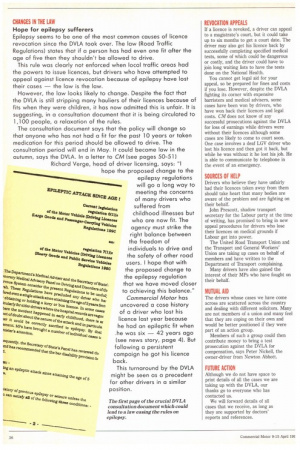CHANGES IN THE LAW
Page 38

If you've noticed an error in this article please click here to report it so we can fix it.
Hope for epilepsy sufferers Epilepsy seems to be one of the most common causes of licence revocation since the DVLA took over. The law (Road Traffic Regulations) states that if a person has had even one fit after the age of five then they shouldn't be allowed to drive.
This rule was clearly not enforced when local traffic areas had the powers to issue licences, but drivers who have attempted to appeal against licence revocation because of epilepsy have lost their cases — the law is the law.
However, the law looks likely to change. Despite the fact that the DVLA is still stripping many hauliers of their licences because of fits when they were children, it has now admitted this is unfair. It is suggesting, in a consultation document that it is being circulated to 1,100 people, a relaxation of the rules.
The consultation document says that the policy will change so that anyone who has not had a fit for the past 10 years or taken medication for this period should be allowed to drive. The consultation period will end in May. It could become law in the autumn, says the DVLA. In a letter to CM (see pages 50-51) Richard Verge, head of driver licensing, says: "I proposed change to the epilepsy regulations will go a long way to meeting the concerns of many drivers who suffered from childhood illnesses but who are now fit. The agency must strike the right balance between ant the freedom of individuals to drive and the safety of other road users. I hope that with the proposed change to the epilepsy regulation that we have moved closer to achieving this balance."
Commercial Motor has uncovered a case history of a driver who lost his licence last year because he had an epileptic fit when _he was six — 42 years ago (see news story, page 4). But following a persistent campaign he got his licence back.
This turnaround by the DVLA might be seen as a precedent for other drivers in a similar position.
REVOCATION APPEALS If a licence is revoked, a driver can appeal to a magistrate's court, but it could take up to six months to get a court date. The driver may also get his licence back by successfully completing specified medical tests, some of which could be dangerous or costly, and the driver could have to join long waiting lists to have the tests done on the National Health.
You cannot get legal aid for your appeal, so be prepared for fines and costs if you lose. However, despite the DVLA fighting its corner with expensive barristers and medical advisers, some cases have been won by drivers, who have won back their licences and legal costs. CM does not know of any successful prosecutions against the DVLA for loss of earnings while drivers were without their licences although some cases are likely to come to court soon. One case involves a deaf LGV driver who lost his licence and then got it back, but while he was without it he lost his job. He is able to communicate by telephone in the event of an emergency.
SOURCES OF HELP Drivers who believe they have unfairly had their licences taken away from them should take heart that many bodies are aware of the problem and are fighting on their behalf.
John Prescott, shadow transport secretary for the Labour party at the time of writing, has promised to bring in new appeal procedures for drivers who lose their licences on medical grounds if Labour get into power.
The United Road Transport Union and the Transport and General Workers' Union are taking up cases on behalf of members and have written to the Department of Transport complaining.
Many drivers have also gained the interest of their MPs who have fought on their behalf.
MUTUAL AID The drivers whose cases we have come across are scattered across the country and dealing with different solicitors. Many are not members of a union and many feel that they are coping on their own and would be better positioned if they were part of an action group.
Members of such a group could then contribute money to bring a test prosecution against the DVLA for compensation, says Peter Nickell, the owner-driver from Newton Abbott.
FUTURE ACTION Although we do not have space to print details of all the cases we are taking up with the DVLA, our thanks go to everyone who has contacted us.
We will forward details of all cases that we receive, as long as they are supported by doctors' reports and references.




























































































